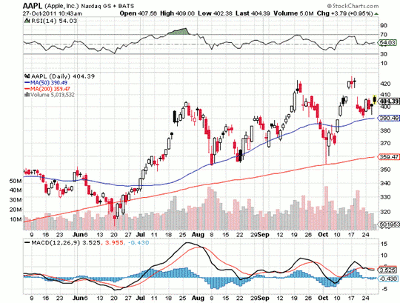The option “Greek” Delta is used to clearly define the profit expectations based on price movement in the underlying stock, which in this case is Apple (AAPL), makers of the popular new iPhone 4S.
Apple (AAPL) sure is making a lot of news lately, what with the company’s earnings report and the introduction of the new Apple iPhone 4S. One may expect the Apple iPhone 4S to push the stock higher (after this dip), but some may believe the rebound will be still short-lived.
Here’s the daily chart:
Perhaps a smart move is to purchase a short-term, out-of-the-money option on the equity. Let’s look for an option with a Delta greater than 20 on Apple and see how the option could play out.
Option Delta and the Trade
First, let’s define option Delta before we go into the option play. Option Delta is a ratio that compares a stock’s change in price to the corresponding price change in said stock’s option. For this example, we are going to use the Apple November 425 call that has an option Delta of about 23%.
See related: How Delta Affects Option Profits
What does the 23% mean? Let’s convert the option Delta into dollars to see. This percentage means that this particular Apple option will gain or lose value just like 23% of 100 shares of Apple as the price changes.
Look at the definition this way if it is easier: For every $1 Apple advances, the call option will increase 23 cents attributable to Delta. So, Apple is currently trading at around $405 (rounded for simplicity) and we have purchased the 425 call. We need the call to advance past $425 (which is not out of the question) in order for the option to be in the money, but can we benefit from a rally that falls short of $425?
The Benefit of Option Delta
Apple is a major momentum stock; just look at what happens after good news: more often than not, the stock rallies. In fact, I don’t think it is a stretch to say that the stock often moves quite a bit. Look at 2009, when Apple dropped as low as the $78 region in late January before rallying to finish the year above $210. That is a major gain.
Playing the November 425 call affords traders the chance to make money in case the stock rallies. If the stock hits $425, that means it has moved 20 points. Take the 20 points and multiply that by 23 cents (option Delta of .23) and you have a move of $4.60 in the call (20 x 0.23).
Conclusion
By looking at the option Delta, we were able to have clear expectations for option profit based on stock movement. Does this mean that playing the Delta is a fool-proof way to analyze an option? No. There are other important pricing factors that affect the value of an option, too.
Time (Theta), volatility (Vega), and more also play important roles. Delta is just one of the “Greeks” that can be taken into account when looking for the right option to purchase. Make sure to do your homework so you can enter the option game prepared to succeed.
See related: Understanding Option “Greeks”
By Dan Passarelli of MarketTaker.com











